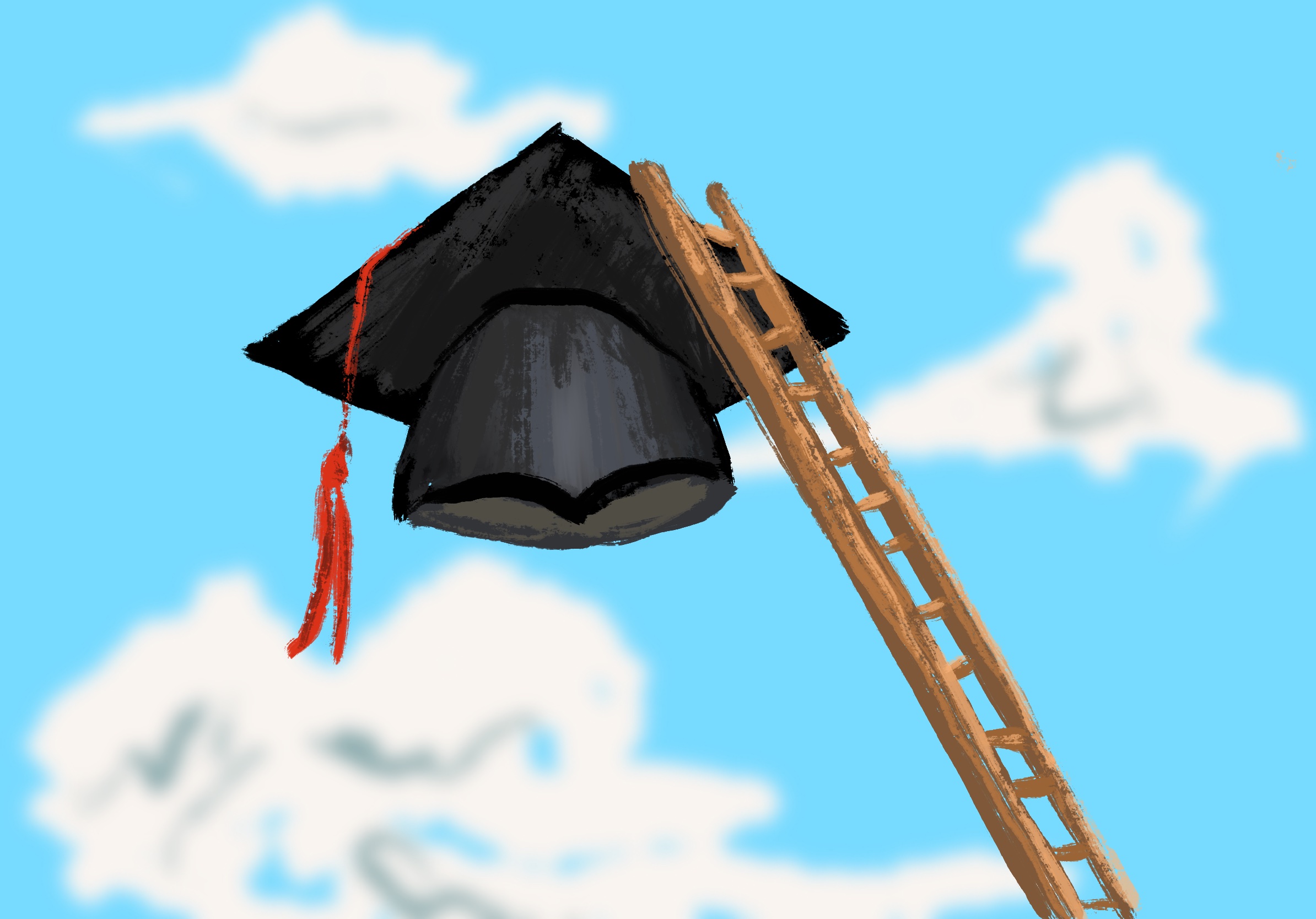Thoughts from the privileged poor
November 11, 2022
 This
piece represents the opinion of the author
.
This
piece represents the opinion of the author
.
 Kyra Tan
Kyra TanI grew up in a working-class neighborhood a few minutes away from the Newark Airport. My father, a limousine driver, purchased the house right before the 2008 recession. As the mortgage payments rose and the foreclosure letters hit the mail, my father worked longer hours behind the wheel. It was the small window between his coming home and my going to bed that I cherished. In true immigrant father fashion, he enlisted me to walk on his aching back. It was then when we had our conversations, usually consisting of him sharing stories from work or his youth. Before his words turned into snores, he’d always give a small blanket lecture about the importance of ‘working hard’ in school, so I wouldn’t end up like him.
So when I learned that our new neighbors had a kid who was going to boarding school on a scholarship, I wanted to do the same. Over the summer, my neighbor told me about a program called ‘New Jersey SEEDS’ that aimed to help low-income students apply to boarding schools. After winning my mother’s approval, she and I joined forces with the neighbors and convinced my father to allow me to apply. Thankfully, there were no other qualms when I was accepted.
To prepare us, the program required us to attend Saturday classes and spend two summers at a boarding school in Pennsylvania. Alongside SSAT prep and learning how to write personal supplements, we had alumni interns hold sessions about the culture of boarding school. I distinctly remember one about clothing, where we learned about companies like Patagonia and Vineyard Vines, and we giggled as he told us the price of Birkenstocks. Despite the amount of preparation I had received, going to boarding school was not easy. The academics were, as expected, rigorous, and I struggled with assignments my peers were completing easily. I was encountering new terms like ‘office hours’ and ‘study sessions’ and was constantly told to ‘reach out for help’ if I was struggling, all concepts which were alien to me.
However, it was the difference in class that shocked me. Everything was different, from the cars people drove, to the massive houses they lived in to the level of parental involvement they enjoyed. Although I eventually adjusted to the level of academic rigor with the help of a few caring teachers, it took me longer to adjust to the levels of wealth and privilege that surrounded me. I no longer attended school with the children of corner-store owners and construction workers but with the children of the people that my father chauffeured. Doctors, lawyers, bankers, politicians, executives—the type of people who could afford to shell out tens of thousands of dollars for high school without batting an eye. During school breaks, my social media feeds would be bombarded with vacation photos in Europe or the Caribbean, and summers would always be spent at their beach house on the Cape or in Maine. The first time I visited Maine was after my acceptance to Bowdoin.
According to Harvard Professor Anthony Abraham Jack, I’m classified as a ‘privileged poor’—a low-income student who attended prep school before attending an elite college. As a privileged poor himself, Jack attended a prep school in Florida before going to Amherst, where he noticed the disparity between himself and students who were ‘doubly disadvantaged’—low-income students who were attending an elite institution for the first time in their lives. Although I’ve only been at Bowdoin for a few months now, I’m starting to see how my background has positively impacted my experience here. I’m eager to utilize resources, academics aren’t a struggle like they used to be, and I no longer feel intimidated by or lesser than my peers. The shock is not as shocking when you’ve already lived through it for a while.
As grateful as I am, this is all to say that I’m incredibly privileged. As November 8’s National First-Generation College Celebration passes a few days before this article’s publication, I’ve noticed that many of my classmates are struggling with their place at Bowdoin. I often think back to my 14 year old self—alone and afraid in a cold Massachusetts town, crying over the first test I failed, thinking that boarding school wasn’t meant for me. I wish that someone had told me it would all be okay. There will be periods of doubt, anger and confusion—all of which I still struggle with—but it always works out. With 17 percent of the Class of 2026 being the first in their families to attend college, we are a measurable bunch. Be proud of the obstacles and challenges you’ve overcome to attend a school like Bowdoin. This place is yours as much as anyone else in our class, and I can’t wait to see what lies ahead for us.
Shihab Moral is a member of the Class of 2026.
Comments
Before submitting a comment, please review our comment policy. Some key points from the policy:
- No hate speech, profanity, disrespectful or threatening comments.
- No personal attacks on reporters.
- Comments must be under 200 words.
- You are strongly encouraged to use a real name or identifier ("Class of '92").
- Any comments made with an email address that does not belong to you will get removed.

Eye opening, profoundly personal, and a beacon of hope for fellow students who may be struggling coming into the second half of semester. Wonderful piece.
Awesome article and perspective. Thank you for taking the time and care to share.
– Fellow Anthony Jack fan
Keep sharing your story! Call upon it in the good and bad!